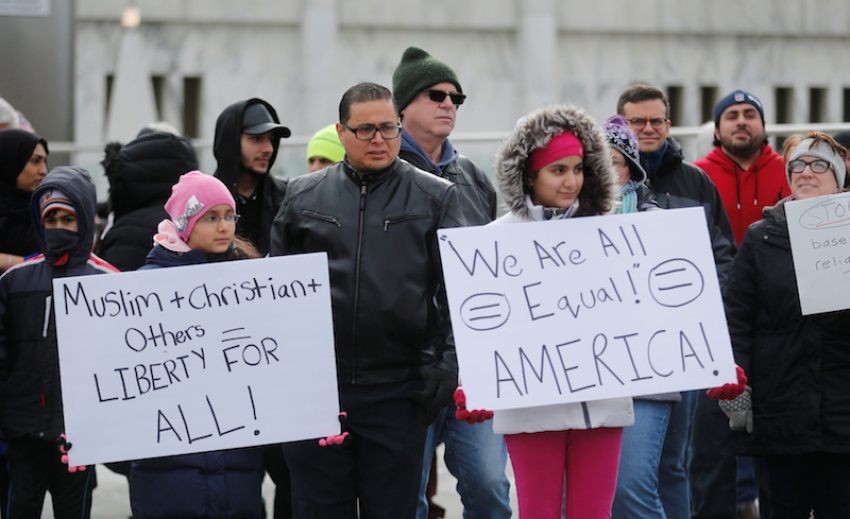Syrian Christians in Pennsylvania Back Refugee Ban: 'Trump Is Right'

Syrian Christians who immigrated to the United States and are currently living in Pennsylvania say that they agree with President Donald Trump's controversial move to indefinitely ban Syrian refugees.
Following the issuance of Trump's recent executive order that temporarily suspends Syrian refugee resettlement in the United States pending a review of the government's lengthy vetting process, a group of Syrian Christians who have lived in the United States for decades offered their thoughts on the order that has caused thousands of Americans to protest at airports across the nation.
Elias Shetayh and Aziz Wehbey, originally from Syria but who now live in Allentown, Pennsylvania, after having immigrated to the U.S. years ago, discussed the banning of Syrian refugees with The Washington Post.
"Trump is right, in a way, to do what he's doing," Shetayh contended. "This country is going into a disaster."
Shetayh has lived in the United States for over 46 years, while his wife, Georgette, has lived in America for 30 years and they are the owners of a restaurant in Allentown. Wehby came to the United States in 1991 and both Shetayh and Wehby are now U.S. citizens and Trump supporters.
"We would not like to bring refugees for a simple reason: We do not know their background," Wehbey told the news organization. "We're concerned about if, God forbid, a terrorist attack happened here . . . that we're all labeled as bad people. I hate to say it."
According to The Washington Post, Shetayh and Wehby's view supporting the Syrian refugee ban is common among those in the Syrian Christian population in Allentown's 6th ward.
Although Shetayh and other Syrian Christians who have been living in the United States for years feel that the refugee ban is an appropriate precaution to take, some of their reasoning seems to stem from the fact that 99 percent of the 12,000-plus Syrian refugees who were resettled in the U.S. in the last year have been Muslim.
"We're not by any means prejudiced against Islam. As long as you're a good human being, you have the right to believe whatever you want to believe," Wehbey explained. "But the majority of the population over here are Christian Syrian. ... Now they're bringing new elements from Syria, refugees shook by a religious war. They may have hate in their heart because of whatever happened to them."
Wehby added, "We don't want to see a religious conflict over here."
Considering that Syria has been involved in a civil war since 2011 and the barbaric Islamic State terrorist group controls territory within the country, the fleeing of millions of Syrians over the last few years has led to the biggest refugee crisis facing the world today.
Although the majority of Syrian refugees who have been resettled to the U.S. in the last year have been Muslim, it didn't take long for Trump's Syrian refugee ban to negatively impact two Syrian Christian families that were detained at Philadelphia International Airport and sent back to Qatar last Saturday, the morning after Trump issued his executive order.
One of the Syrian families deported to Qatar was supposed to join their relatives Dr. Ghassan and Sarmad Assali, who are orthodox Christians, in Allentown.

Assali's two brothers, their wives and children began their attempt at immigrating to the United States in 2003 and finally received approval from the U.S. government last December.
"Two security guards were waiting for them," Sarmad Assali said as she explained Saturday's encounter at the airport with NBC 10. "They took them. They said, 'Are you Syrians?' They said, 'Yes.' They said, 'Come with us.'"
"I understand [Trump] wants to make America safe," Assali added. "We're all on with this. I definitely want to be in a safe place. But people need us and we need to be there for them."
Not all pro-Trump Syrians in Allentown are supportive of the refugee order.
"These poor people are coming from war. For them to get here and all of a sudden to be told — and they're legal and have visas — and all of a sudden you tell them, 'You can't come in. You have to go back' — that's a shame," Fouad Younes told The Washington Post.
Younes, whose family emigrated from Syria during the civil war, explained that he was for Trump because of his stance on foreign policy, noting that he usually leans liberal.
As the Younes family has been successful in getting a number of their relatives to the United States, they were holding out hope that they could help one of their family members who has not made it to the United States apply for refugee status. However, the executive order has put those hopes on hold.
Although Younes admits that there are no "moderate" rebel groups in Syria, he still thinks the U.S. government should be more sympathetic to the "poor people that are running away from war."
"These aren't people that are going to hurt you," Younes said.
Although Younes might not agree with Trump's executive order, that does not mean that he now opposes the Trump presidency.
"It's not going to necessarily turn me against him," Younes asserted. "It just turns me against the policy. I've always been against the policy."
"But instead of fighting amongst ourselves, let's give the man a chance," he added. "Maybe he's going to bring jobs back."
A Syrian refugee who was resettled in the United States with his family just over 16 months ago told The Washington Post on the condition of anonymity that even though there are heightened tensions in Syria, those tensions stay in Syria.
"Radical Muslims don't come to the United States," the man said. "The people that are coming here are people looking for a better life."



























